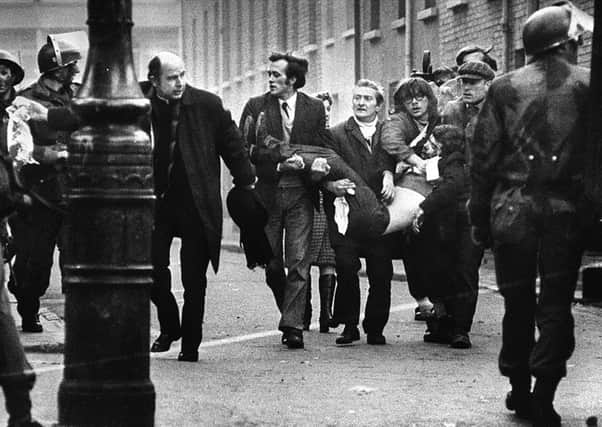Bloody Sunday bishop Edward Daly died a hero, says victim's relative


The Catholic cleric, who died on Monday aged 82 after a long illness, was a life-long critic of all violence.
As a young priest he famously waved the bloodied rag as a symbol of ceasefire as he helped fatally injured civil rights protester Jackie Duddy in Londonderry in Northern Ireland in January 1972.
Advertisement
Hide AdAdvertisement
Hide AdHe fought to clear the names of all the victims after paratroopers opened fire and killed 13 people. Fourteen were injured, and another was to die later.
Mr Duddy’s older sister Kay said: “He was such a special friend to us because of Bloody Sunday, because of what he did for Jackie in his dying moments when he was there with him, it just meant the world to us that Jackie did not die on his own.”
Bloody Sunday has been described as one of the catalysts of IRA recruitment and the 30-year conflict which left more than 3,000 dead and many others injured.
Demonstrators seeking one man, one vote and other concessions from the unionist-dominated government of Northern Ireland had gathered for a march in Derry.
Advertisement
Hide AdAdvertisement
Hide AdAt the time Dr Daly was a curate aged 39 from Belleek in rural Co Fermanagh who served at St Eugene’s Cathedral in Derry.
He joined the march as it passed the cathedral en route to the city centre.
Amid chaotic scenes soldiers opened fire.
Dr Daly was near textile worker Mr Duddy, 17, when he was shot by soldiers, and anointed him and gave him the Last Rites.
Then the clergyman and other marchers tried to bring him to safety, the priest leading the way with a handkerchief in his hand.
Advertisement
Hide AdAdvertisement
Hide AdBishop Daly was a prominent witness at Lord Widgery’s inquiry soon after the event, which exonerated troops from the Parachute Regiment, concluding that they had come under attack from gunmen and bombers.
He said: ‘’I felt a responsibility to tell the story of what I saw and what I saw was a young fella who was posing no threat to anybody being shot dead unjustifiably.”
Ms Duddy said it was a “second atrocity” how the victims’ names were dragged through the mud by the tribunal.
She added: “He (Bishop Daly) always said he would fight to his dying breath to make sure our loved ones names were cleared. He was an unsung hero.”
Advertisement
Hide AdAdvertisement
Hide AdAfter a mammoth inquiry by Lord Saville the demonstrators were exonerated in 2010 and prime minister David Cameron said the killings were “unjustified and unjustifiable”.
Eamonn McCann, who was at the Bloody Sunday march and chaired the Bloody Sunday Trust, remembered the bishop as a priest, clearly distressed, describing the killing of Mr Duddy and saying he did not have a gun and he did not have a petrol bomb.
“I think his words (then) were more influential than just the photograph. He would also criticise the IRA afterwards over the years.
“He was credible. He was quite a conservative man and not a radical priest.”
Advertisement
Hide AdAdvertisement
Hide AdHe led the church in the city through some of the darkest days of the conflict and believed the violence of the Troubles was futile and morally unjustified.
The head of the Catholic Church in Ireland Archbishop of Armagh Eamon Martin lauded him as a fearless peace builder who took a personal interest in those who suffered miscarriages of justice.
“His untiring advocacy for the Birmingham Six, the victims of Bloody Sunday and for the families of those murdered by paramilitaries earned him respect from some, suspicion from others.”
He was Bishop of Derry from 1974 until 1993, stepping aside after suffering a stroke. In recent years he had battled a long-term illness.
His funeral will be held in the city on Thursday.